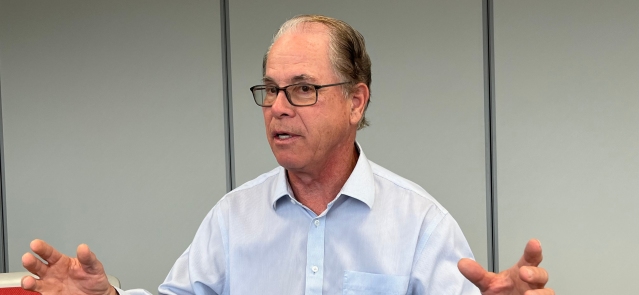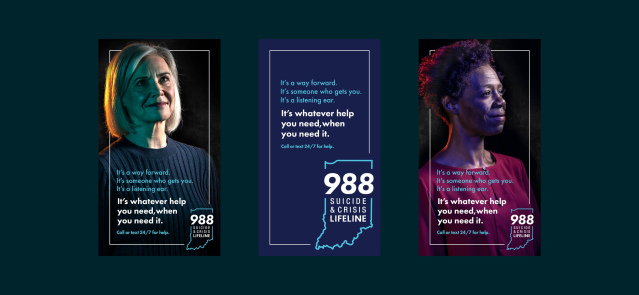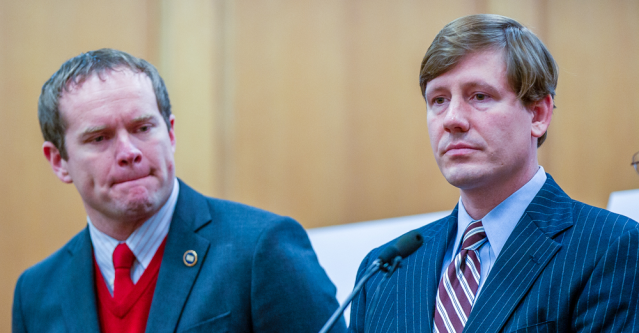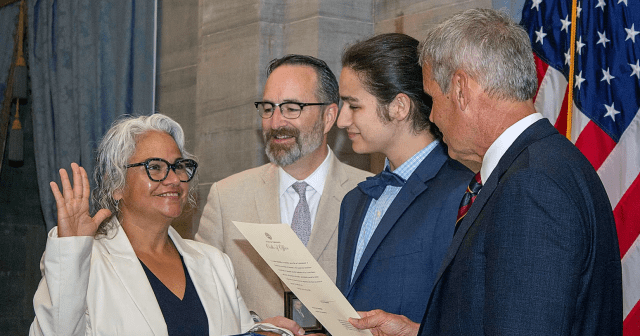Republican gubernatorial candidate Mike Braun isn’t committing to detailed policy proposals ahead of the election, although he says he will be heavily involved with the Legislature if he becomes governor.
Braun met with reporters for about a half-hour Friday at the Indiana Republican Party headquarters, a little more than eight weeks ahead of Election Day.
Here are some key points from the question-and-answer period:
Uncertainty on more policy specifics
Braun avoided policy specifics throughout the primary campaign and has since only detailed a proposal for property tax structure changes.
Asked by State Affairs whether he would release more details on his policy plans, Braun replied, “Remains to be seen.”
Democratic candidate Jennifer McCormick has also released a property tax proposal, along with plans on education and ethics reform.
Braun criticized the value of McCormick’s proposals while remaining vague about releasing details of his agenda.
“I will do some of that on the particular issues, but remember, when you do it, you’ve still got to make sure that it’s going to pass a legislature,” Braun said. “I think whatever Jennifer puts out there, it’s going to be unlikely to pass the legislative muster, a lot of the stuff she’s detailing.”
McCormick’s campaign didn’t immediately reply to a request from State Affairs for comment.
Active in dealing with Legislature
Braun pointed to his three years in the Indiana House before his successful 2018 U.S. Senate campaign as helping him navigate the legislative process.
He suggested he would be more of an active participant with lawmakers in the mold of Mitch Daniels as governor during the 2005 through 2012 legislative sessions than Mike Pence or Eric Holcomb while they were in office.
“What you’re going to find is that you’re going to be able to get a hold of me as someone that’s going to be here during the week,” Braun said. “The other thing I’m going to do that I think, probably, Mitch did better, maybe, than Pence and Holcomb is I’m going to communicate until they’re tired of hearing me with the Legislature, both sides of the aisle.”
Ethics policy reforms
McCormick released Thursday an ethics plan that seeks to improve sexual harassment reporting throughout all levels of state government. That proposal follows news accounts of three women who claim they were harassed by Thomas Cook, a former chief of staff to Indianapolis Democratic Mayor Joe Hogsett.
Braun said he believed McCormick “wanted to separate herself” from Hogsett by releasing the proposal but also said “it probably makes sense.”
“I think that’s kind of sweet irony that Jennifer had to put that out, juxtaposed to a Democratic administration,” Braun said. “I haven’t read her ethics proposal, but I think, with what did occur, that probably something needs to be done. So in general, I’d be for that. I don’t know what’s particularly in there, but I can’t imagine that would be too off base in terms of how you’d approach that issue.”
State agencies in his sights
Braun said he planned on taking close looks at the operations of several state agencies, particularly the Family and Social Services Administration and the Department of Child Services.
The Indiana Department of Transportation is the source of many public complaints, Braun said, but he expressed less concern.
“That’s probably the one [department] people complain the most about, and then it’s hypocritical,” Braun said. “They want more roads and bridges and they don’t like all the congestion and traffic issues associated with it. So that’s human nature.”
He said he aimed to find ways to cut operating costs for state agencies.
Asked what he would do differently from what Republican governors have done over the past 20 years, Braun cited his experience of building his Jasper-based company, Meyer Distributing, into a national business.
“That’s the thing, I think, I bring to this race that no past governor really has been able to bring,” Braun said.
Overseas travel as governor
Holcomb just wrapped up his 25th international trip as governor, which included stops in Slovakia, Italy and Ukraine.
Holcomb cited those trips as important to building relationships to attract more investment in the state.
Braun said he wants to maintain a flow of foreign investment but without the frequent travel.
“I can tell you that I won’t be spending that much time overseas,” he said. “That’s not something you have to do as governor. I’ll do it when it’s essential. Won’t probably make it a common feature.”
Only weekdays in Indianapolis?
Braun often mentions his desire to be in his southern Indiana hometown of Jasper.
Asked whether he would move into the Governor’s Residence on the northside of Indianapolis if he wins election, Braun said yes.
“It’ll be a welcome relief not to be burning 10 to 12 hours a week to head out to D.C.,” Braun said of his travels from Jasper to Washington for U.S. Senate business.
Although Braun’s sister lives in the Indianapolis suburb of Zionsville, he wouldn’t reside in the capital city fulltime: “When it comes the weekend, I’m going to scoot my rear end back south.”
Tom Davies is a Statehouse reporter for State Affairs Pro Indiana. Reach him at [email protected] or on X at @TomDaviesIND.





